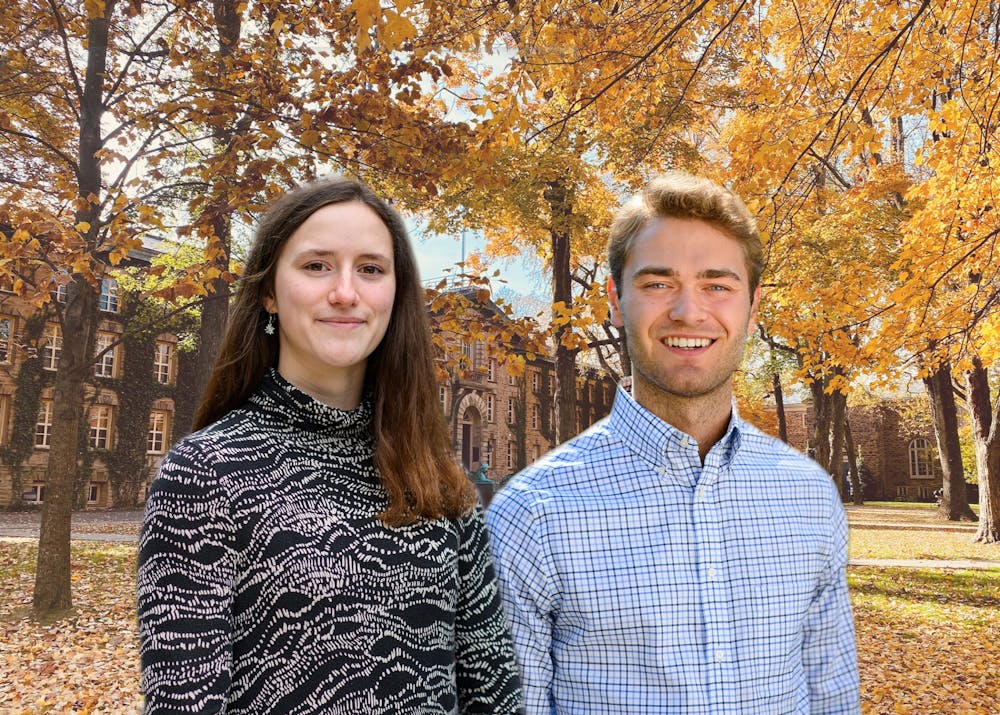Christian Potter ’22 and Claire Wayner ’22 have been awarded Moses Taylor Pyne Prizes, the highest general distinction an undergraduate can receive.
The Pyne Prize, which is awarded annually to high achieving seniors, recognizes “excellence in scholarship, character, and effective support of the best interests of Princeton University.” The award was founded in 1921, honoring and remembering M. Taylor Pyne, Class of 1877.
The prize for the award consists of the tuition fee of one academic year, which for the 2021-22 academic year totaled $56,010, to be split amongst the recipients. The prize will be awarded by University President Christopher L. Eisgruber ’83 on Feb. 19 at the annual Alumni Day Luncheon and Awards Ceremony.
Previous recipients of the award include U.S. Supreme Court Justice Sonia Sotomayor ’76 and Princeton President Emeritus Robert F. Goheen ’40.
Hailing from McLean, Va., Potter is concentrating in the School of Public and International Affairs (SPIA) where he received the R. W. van de Velde Award for policy task force work during his junior year.
He also received the Shapiro Prize for Academic Excellence and served in executive positions in the Undergraduate Student Government (USG).
Most recently, Potter served as the USG President throughout 2021, following a term as Academics Chair in 2020. During his time with USG, Potter worked to establish mixed concentrations and flexible Pass/D/Fail policy for students, which Potter said USG has “made major progress towards” accomplishing.
On campus, Potter has worked as an Orange Key tour guide, a Peer Academic Adviser for Mathey College, and a fellow at the Center for International Security Studies.

In an email to The Daily Princetonian, Potter said that he was nominated by Associate Professor of Psychology Emily Pronin.
“So many mentors went the extra mile to support me in times of general and individual struggle,” Potter wrote. “I've been pushed to grow in wonderful ways.”
As for his independent work, Potter’s senior thesis is heavily involved in legislation in the U.S. Senate.
“I am exploring how [budget] reconciliation has diverged from its originally established purposes and how that development impacts a wide array of policy issues today,” he wrote.

After graduation, Potter says that he will move to Washington, D.C. and work with McKinsey & Co. “on projects that improve government operations at the federal and state levels.”
Potter also said that he plans to study law in the hopes of eventually handling federal policy issues.
He told the ‘Prince’ he wants to thank “the friends who’ve made Princeton such a happy place for [him],” adding that, “No one can do this alone, and certainly not [him].”
Wayner is a Civil and Environmental Engineering concentrator from Baltimore, Md., earning certificates in Environmental Studies and Sustainable Energy.
Wayner is a two-time recipient of the Shapiro Prize, a recipient of the George B. Wood Sophomore Legacy Prize, the Truman Scholarship for public service and the Udall Scholarship for environmental leadership. She is also a member of the Phi Beta Kappa academic honor society and Tau Beta Pi engineering honor society and worked as an intern for the Scholars in the Nation’s Service Initiative (SINSI).
While at the University, Wayner has dedicated much of her time to achieving environmental justice and sustainability goals. She served as the President of the Princeton Student Climate Initiative for two years, founded the inaugural Sustainability Committee under USG, and worked as an EcoRep for the Office of Sustainability.
Wayner is also an active member of the Climbing Team and co-founded the Birding Society.
“I see climate change as the defining crisis of our time,” Wayner told the ‘Prince’ in an interview. “That's what I want to dedicate my career and personal life to: working to reduce emissions as quickly as we can and reduce the temperature increase.”
After she graduates this May, Wayner says she has plans to move to Boulder, Co., and work for an environmental non-profit institute.
“[RMI does] a lot of clean energy research and consulting,” she said. “[They work] with groups like electric utilities to try to introduce more clean energy into their generation portfolio.”
In an email to the ‘Prince,’ Wayner’s senior thesis adviser, Jesse Jenkins, expressed his pride in her, explaining that he nominated her with “wholehearted support.”
“I did not award any A+ grades that semester, but if I had, the first one would have gone to Claire,” Jenkins wrote, adding that all of the grades Wayner has received were either A+ or A.
Jenkins also quoted Cheryl Lafleur ’75, who worked with Wayner during a summer internship, saying that Wayner is destined to become “a clear future leader in the energy sector.”
Wayner wishes to thank “everyone who has supported [her] during [her] four years [at Princeton],” including “friends, professors, and family.”
Wayner is a former columnist for the ‘Prince.’
Andrew Somerville is a Head News Editor who has covered USG, University and COVID-related affairs. He can be reached at jas19@princeton.edu or on Twitter @andr3wsom.
Correction: A previous version of this article stated that the prize for the award is the comprehensive fee for one academic year, or $77,690, but it is only the tuition fee, or $56,010. It was also unclear that the award is split amongst the recipients.








